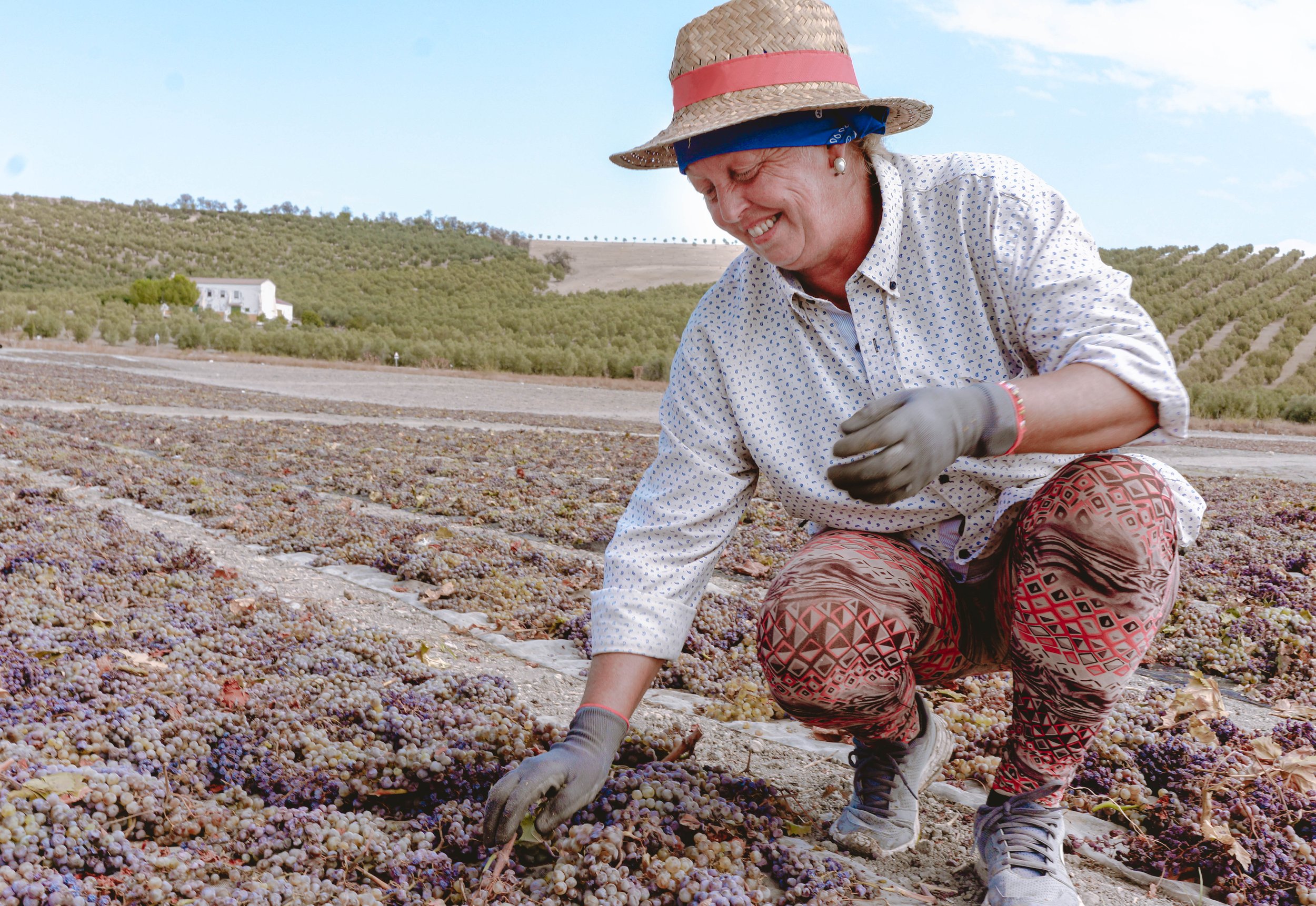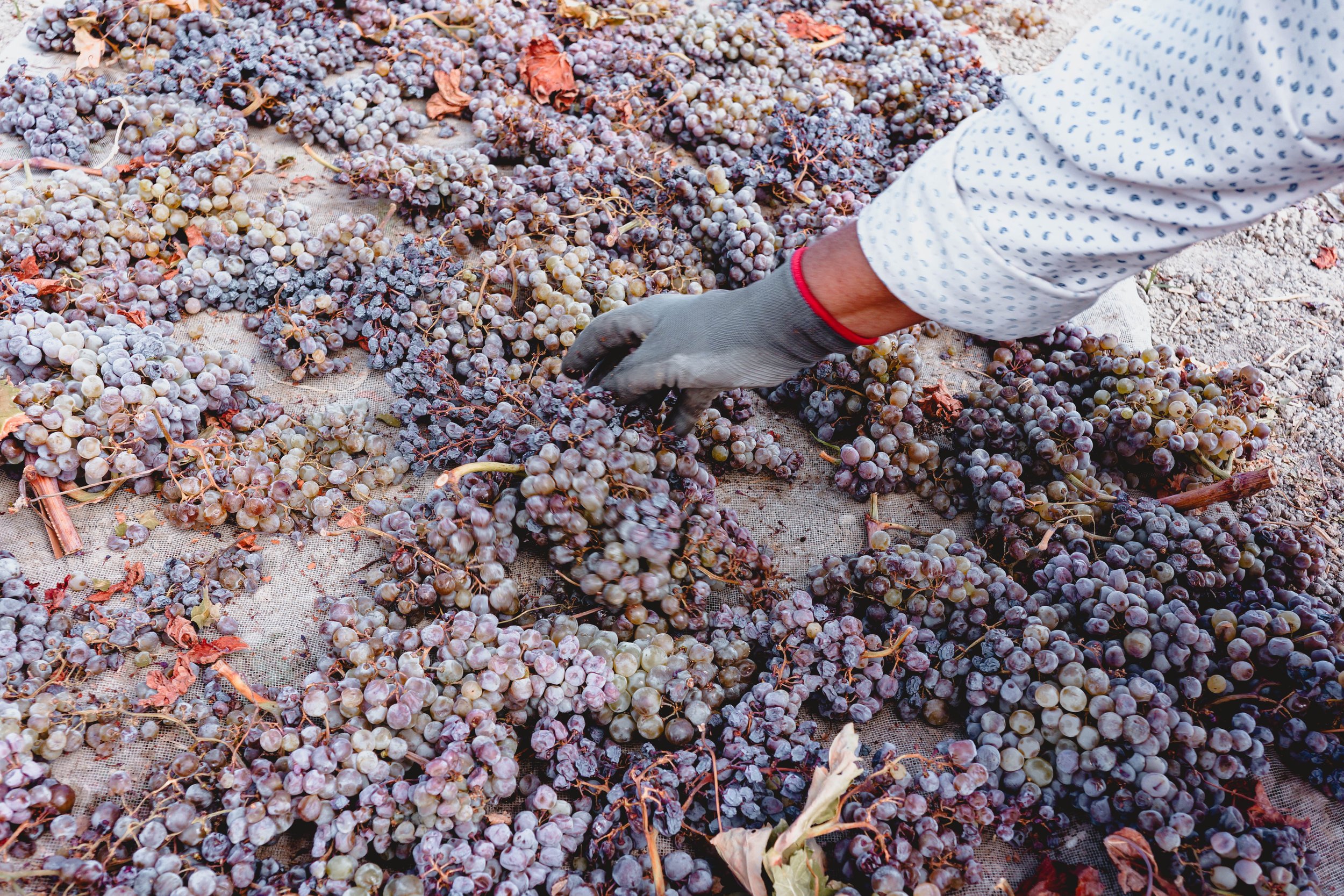Vinos generosos
The versatility of the Pedro Ximénez grape —white wines from Montilla-Moriles
From left to right: Fino, Amontillado, Oloroso, PX
Generous Wines
Dry elaborations
Vino de Tinaja
To appreciate the transformative potential of Pedro Ximénez, it’s helpful to try it in one of its most simple states – as a base harvest wine. Called vino de tinaja (named for the enormous ‘tinaja’ cement vessels in which it is traditionally fermented and stored), this dry white wine of very low acidity is not particularly fragrant but it is simple and easy to drink. It’s usually sold unfiltered and has a relatively short shelf life when opened. Its taste is fruity and mineral.
Tinajas - for fermenting sweet and dry musts
Fresh harvest wine - vino de rama - vino de tinaja
Fino
After fermenting in either tinajas or stainless-steel tanks, a capataz gauges the quality of each lot of mosto and determines its fate: whether it will start life biologically as a fino, oxidatively as an oloroso, or as a simple white wine. Only the best lots with particular finesse and delicacy are suited to become generous wines. Grape musts with greater tannic structures or higher levels of acetic acid (ideal for vinegar production) are transferred to other facilities for other useful ends.
Once classified, mostos selected for finos begin their life within a solera system, a traditional winemaking method unique to Andalucía. Using very old oak barrels stacked in tiers called criaderas, new wines move through levels of aging to gradually mix with older wines, a process known as fractional blending. Over time, and with the presence of oxygen and velo de flor—natural biological yeasts—mostos evolve into finos.
Fino means “refined” in Spanish. And that it is. Elegant, structured, and bone-dry (one of the driest wines on earth), a well-crafted fino is a treasure. It can combine with any plate or stand on its own.
Fino - biologically aged generous wine
Amontillado
Named after its origin in Montilla, amontillados start life as finos. Their journey of transformation begins once the process of biological aging ends; that is, when the presence of flor dies and oxidation sets in. This process happens naturally when finos are left to age for long periods, i.e., decades in solera systems.
Amontillados are very interesting wines. They combine two styles: a savory, nutty character born from oxidation and a flor essence from an earlier life.
Amontillado - biologically and oxidatively aged generous wine. Pictured above - el velo de flor
Oloroso
Oloroso is the only dry generous wine that is oxidatively aged (sans velo de flor) from beginning to end. Of all the styles, it is considered the richest and roundest. Unlike fino, it is not delicate and lean; it has body and heft and it is full and viscous in the mouth. Though it is as dry as fino (less than 2 grams of sugar per liter), it can give the impression of sweetness. This is due to higher glycerol levels than fino (as the velo del flor consumes all the wine’s flesh).
Oloroso means fragrant in Spanish, and that it is. It smells of walnuts, figs, and tea, and tastes like all those great things, too. In the pueblos of Córdoba, it is also frequently used to perfume pocket squares. Highly aromatic on the nose and luxurious and complex on the palate, it is one of the world’s great wines.
Oloroso - oxidatively aged generous wine
Sweet elaboration
PX
Perhaps the most famous elaboration of Pedro Ximénez is “PX,” a naturally sweet dessert wine.
PX is an artisan product. It is crafted from hand-harvested Pedro Ximénez grapes that are manually rotated while drying in the sun, in rows of paseras, and then pressed used woven capacho mats. The grape mosto is then set to partially ferment in immense tinajas. To stop the fermentation process in preparation for bottling or solera aging , a neutral grape brandy is added to bring the wine up a few degrees to 15°.
Las paseras de Montilla
Hand-harvested semi sun-dried grapes used to craft PX sweet wine
Pure PX is the sweetest wine on earth. The best selections have over 400 grams of natural sugars per liter. The wine can be enjoyed young, of the harvest year, or— for a truly special treat—as a solera-aged wine. Some solera-aged PX run upwards of 500 euros for 500 milliliters. The wine’s flavors and aromas are of toffee, figs, chocolate and dried fruit.
PX is perfect for crafting high-quality spirits: for blending directly into rums, coffees, beers and other products.









